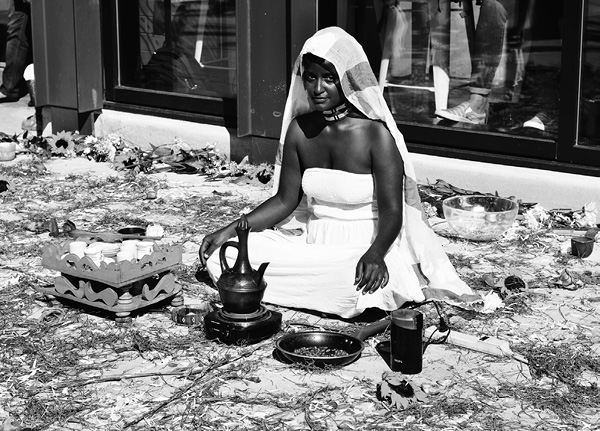
COMMON GROUND
first performed on September 25, 2016
outside of Compass Coffee in DC’s Shaw neighborhood, 8th Street location, Washington, D.C.
performed three times in 2016
TSEDAYE MAKONNEN
Nana Ama Bentsi-Enchill, Margaret Boozer-Strothers, Lorenzo Cardim, Jade Delaney, Adia Gill, Janelle Gill, Leslie Holt, Bra’ Niya Jordan, Megan Livingston, Senai Makonnen Livingston, Malachi Lukes, Saida Maki-Penttila, J.J. McCracken, Devin McDowell, Malik Roche, Jaleel Roche, Tsige Tafesse, Gwen West
Washington, D.C.
674476233t674476233s674476233e674476233d674476233a674476233y674476233e674476233@674476233g674476233m674476233a674476233i674476233l674476233.674476233c674476233o674476233m
tsedaye.com
COMMON GROUND
TSEDAYE MAKONNEN
I created a participatory performance series that took place in D.C. for “What’s Going On Shaw,” a public art project that was curated by Kristina Bilonick & Deirdre Ehlen MacWilliams. It incorporated rituals from my Ethiopian-American background within the context of current microcultures in Shaw’s neighborhood, where I was born. In blending the rituals of Ethiopian coffee ceremonies with the culture of today’s grab & go coffee, a group of participants and I, from the community, performed a coffee ceremony with a twist that nods to the changing landscape of Shaw. We activated the space in front of local Shaw businesses and streets, including Zenebach Restaurant, which is now closed, a direct result of rapid gentrification taking place in D.C. We also performed this piece in front of a local cafe chain that symbolizes the development that the residents have become somewhat traumatized by and lastly at Creative Time Summit in D.C. This performance engaged in bridging the gap between the microcultures by helping form new bonds and tightening existing ones. In this piece, I wanted to reflect the present day situation of this historical district.
The children of Shaw Community Center, where I teach performance and visual art, assisted me in making 100 ceramic coffee cups to use during the performance. I gave the performers ritual-based tasks that were done in slow gestures while I was ceremonially preparing the coffee. While one performer wafted the incense around and activated the space, someone else was sprinkling ground cinnamon, cloves, cardamom (spices used in Ethiopian food and drinks) around the audience. The children of Shaw passed out the coffee and asked the audience specific questions on how they felt about the changes happening in D.C, this stimulated discussions among the crowd. Since Ethiopian food and culture has become a part of D.C.’s identity, the coffee ceremony was a way to slow everyone down. Get the community and neighbors to actually see and speak to each other, whereas usually that doesn’t typically happen. There’s a clear invisible border between the newcomers and the locals, the native Washingtonians and the immigrants, the new businesses and the people. The audience engagement was a way to come to a collective solution where everyone could begin to feel like they’re at home together by sharing “Common Ground.”